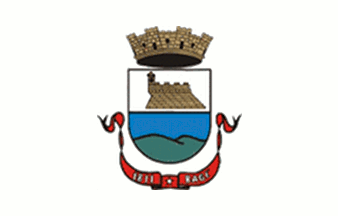 image by Dirk Schönberger,
31 December 2011
image by Dirk Schönberger,
31 December 2011
Source: at http://www.bage.rs.gov.br/simbolos.php

Last modified: 2012-02-10 by ian macdonald
Keywords: rio grande do sul | bagé |
Links: FOTW homepage |
search |
disclaimer and copyright |
write us |
mirrors
 image by Dirk Schönberger,
31 December 2011
image by Dirk Schönberger,
31 December 2011
Source:
at
http://www.bage.rs.gov.br/simbolos.php
A white flag with the municipal arms in the centre.
Official website at
http://www.bage.rs.gov.br
Dirk Schönberger,
31 December 2011
The municipality of Bagé (116,794 inhabitants in 2010; 4,905. 5 sq. km) is
located in southeastern Rio Grande do Sul, 400 km of Porto Alegre.
Bagé was founded in a region once fiercely disputed by the Portuguese and
Spanish colonial powers. On 12 February 1761, the Treaty of Madrid, signed in
1750 and establishing the border between the two colonial empires, was
cancelled. In 1773, João Josť Vertiz y Salcedo, Governor of Buenos Aires,
attempted to expel the Portuguese from the (Spanish) Province of Saõ Pedro de
Sul; he ordered the building of Fort St. Thecla to strengthen the Spanish
rule over the area conquered 10 years before. The Portuguese started on 28
February 1776 the siege of the fort, whose garrison surrendered on 24 March
1776; since they could not maintain a garrison in the fort, the Portuguese
decided to demolish and burn down the fort. In 1801, the colonial
government secured the border by allocating several plots of land to
cattle-breeders. On 9 October 1809, Field Marshal Diego de Souza was
appointed Captain General of Saõ Pedro; he was commissioned to intervene in
the Plata area against revolutionary movements that had emerged in Buenos
Aires and Montevideo. When Artigas' uprising broke out in Uruguay, Charlotte
of Spain, the wife of King of Portugal John VI (1767-1826, crowned in 1816),
asked her husband to support the Spanish colonial power. John VI ordered his
troops to stay along the border and to enter Spanish territories when needed.
The "Pacification Army of the Eastern Band", a 3,000-men force led by Diego
de Souza, was stationed at the foot of the Bagé hills. According to the
historian Tarcisio Antonio da Costa Taborda, the town of Bagé was officially
founded on 17 July 1811 when Souza appointed Pedro Fagundes de Oliveira
commander of the Bagé Camp, leaving there soldiers, merchants and women who
had accompanied the army. Involved in several events of the War of the
Ragamuffins, Bagé was made a parish and municipality on 5 June 1846 by
Provincial Laws No. 64 and No. 65, respectively.
http://www.bage.rs.gov.br/historia.php
- Municipal website
The flag
of Bagé was designed for the official visit of President of the Republic João Belchior Marques Goulart (1919-1976, President, 1961-1964), scheduled to 17
December 1963. The President had to inaugurate the new water supply system of
the town; Mayor Pr. Boaventura Mielle da Rosa thought that a municipal flag
was required for the ceremony. Dr. Tarcisio Taborda, designer of the
municipal coat of arms, proposed to place it on a white cloth to make a
municipal flag. The first copy of the flag was realized by Sapiran Bito.
The flag was subsequently often used in official events; it was eventually
made official on 5 October 1972 with the adoption of Municipal Law No. 1,706,
based on a Bill tabled by Councillor Iolando Maurente. Article 1 of the Law
describes the flag as "White field with the coat of arms in full colors, as
prescribed by Municipal Law No. 548 of 9 May 1955."
http://web.archive.org/web/20070705081249/http://www.bage.rs.gov.br/pdf/leis/pmb_lei_municipal_1706.pdf - Law No. 1,706
The coat of arms of Bagé
was designed for the celebration of the bicentenary of Diego de Souza.
Councillor Dr. Tarcisio Taborda drafted a proposal of coat of arms with the
help of the heraldist and historian Pr. Walter Spalding. The artist Irio
Malafaia realized the first coat of arms, which was adopted on 9 May 1955 by
Law No. 248, based on a Bill tabled on 1 April 1955. Article 1 of the Law
blazons the arms as:
"Portuguese-shaped arms, per fess azure and argent.
In the upper field, azure (blue), a fortified bastion with a watch-tower or.
In the lower part, argent, the Bagé hills, vert (green). The shield
surmounted with a four-towered mural crown or. Below the shield a scroll
gules (red) with the writing or "1811 - Bagé".
The colors of the shield are
the national and Rio Grande do Sul colors. The loyalty of Bagé to the
institutions is represented by azure. Argent means nobleness and highness.
Green represents the field's fertility and richness. Gold represents the
ardor and strength. Red means courage and generosity. The bastion recalls
Fort St. Thecla, the place where the first fighting for the incorporation of
the territory to Brazil happened, and, therefore, the military origin of the
town. The Bagé hills highlight the generous natural environment and namesake
of the town. The mural crown is the heraldic representation of a big,
fortified town. "1811" is the foundation's year of the town
http://web.archive.org/web/20070705081324/http://www.bage.rs.gov.br/pdf/leis/pmb_lei_municipal_548.pdf
The use of the coat of arms is prescribed by
Municipal Law No. 1,968 of 15 August 1978, based on a Bill tabled on 3 August
1978 by Iolando Marchado. The coat of arms should appear on all kind of
material used by the municipal administration (Art. 1) and on the vehicles
used by the municipal services, with the service's name written in black
letters (Art. 2)
http://web.archive.org/web/20070327042331/http://www.bage.rs.gov.br/pdf/leis/pmb_lei_municipal_1968.pdf
Ivan Sache, 7 January 2012